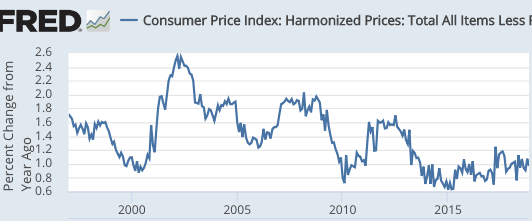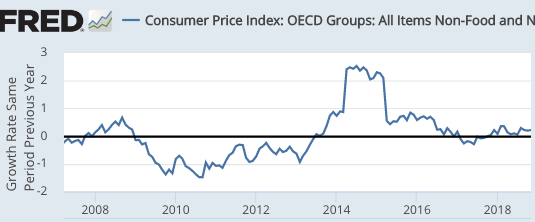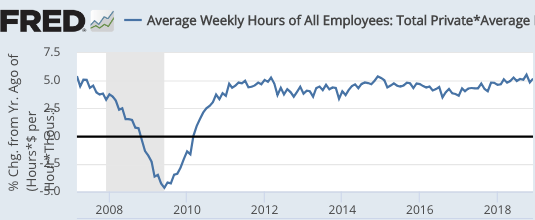I frequently get questions about my recent proposal to increase Fed accountability and transparency. Thus I thought it might be useful to make another attempt to explain the idea, based on some of the misconceptions that I have come across in conversation. Here are 9 important points to keep in mind:
Point #1: The Fed already does what I am asking them to do, but not in a systematic way.
All sound organizations will evaluate past decisions, in order to learn from mistakes. Because the Fed is clearly a sound organization, Fed officials do evaluate and critique past policy decisions, but only on an ad hoc basis. Thus when Ben Bernanke was at the Fed, he occasionally criticized Fed policy decisions made during the Great Depression (too contractionary) and the Great Inflation (too expansionary). Bernanke was able to determine that policy mistakes had occurred by looking at outcomes—demand was too low in the 1930s and too high in the late 1960s and 1970s. Most famously, at Milton Friedman’s 90th birthday Bernanke famously said, “You’re right, we did it. We’re very sorry. But thanks to you, we won’t do it again.” Here Bernanke is also alluding to the purpose of evaluating past policy errors, to avoid similar mistakes in the future.
You might say, “Ah, but it’s easy to criticize the errors of your predecessors, not so easy to admit to your own failings.” Yes, but Bernanke is a better man than you or I, and in his memoir (p. 280) he did exactly what you are saying is not so easy (discussing the Sept. 15, 2008 meeting):
At the end of the discussion we modified our planned statement to note market developments but also agreed, unanimously, to leave the federal funds rate unchanged at 2 percent.
In retrospect, that decision was certainly a mistake. Part of the reason for our choice was lack of time—lack of time in the meeting itself, and insufficient time to judge the effects of Lehman’s collapse.
Bernanke doesn’t say why he now believes the decision was certainly a mistake, but I am 99.99% sure that I know why, even though I’m not a mind reader. Bernanke believes that, in retrospect, a more expansionary monetary policy stance in September 2008 would have pushed the economy at least a tiny bit closer to the Feds inflation/employment objectives in 2009. Maybe not a lot closer, but at least a tiny bit.
Point #2: Monetary policy evaluation is implicitly an evaluation of whether previous policy was too easy or too tight.
One can imagine a universe where monetary policy evaluation is extremely complicated. Where the Fed uses QE to try to control inflation and IOR to try to control employment. But that’s not the universe we live in, or at least both the Fed and I believe things are much simpler than that. The Fed basically works from a simple AS/AD framework, where their key policy tools all impact demand, which then impacts the various goal variables of Fed policy (PCE inflation and employment.) That’s why in any evaluation of previous policy, one can simplify things by boiling it all down to one question: Were previous policy settings too easy, too tight, or about right? That’s the framework Bernanke used when discussing previous policy errors.
Point #3: Policy self-evaluation does not constrain the Fed, or limit their ability to conduct appropriate monetary policy.
There is no good reason why the Fed would want to oppose my proposal for self-evaluation of previous policy decisions. This is something they already do; I am merely asking for a more systematic process. Thus under my plan the Fed might report to Congress every 6 months. The only other requirement is that they be as specific as possible in explaining why they evaluated previous policy as being too easy or too tight. They don’t even need to use that language; they could talk in terms of too expansionary or too contractionary. But they should provide as much relevant data about the recent performance of the economy as possible, to make it easier for Congress to see how they reached their conclusion. Presumably they would talk about inflation, and also various labor market indicators.
Point #4: The evaluation process will actually be more rigorous if the Fed is given more flexibility.
This is counterintuitive, and requires some explanation. Let’s take the example of how far back they should look, when evaluating previous decisions. If Congress were to mandate a one-year look back, it would actually give the Fed more wiggle room. The Fed could say, “We haven’t yet hit our targets, but that’s because it takes about 18 months for monetary policy to fully impact inflation and employment.” Instead, Congress should let the Fed decide these technical questions. Let them decide how long it takes, and then have the Fed look back at decisions that the Fed itself believes have most strongly impacted the current condition of the economy. Thus the Fed might say, “Inflation is a bit too high, and we believe this reflects excessively expansionary decisions made between 12 and 24 months previously.” They get to choose the impact lag, which prevents them from dodging blame by saying there’s not yet enough time to evaluate the decisions.
Similarly, let the Fed decide what constitutes success. They would probably include 2% PCE inflation as one component, but also include data on employment in their report. If you specify what metrics the Fed is to use, then they can always play a shell game. Overall PCE inflation is too high? “We focus on core PCE inflation”. Etc. Better to let the Fed tell us what metrics they use to decide if policy had been too stimulative. Then they have no place to hide. Sure, they could suddenly claim that the inflation target is 5% or 0% (to match reality), but would that be credible? What if they suddenly said (in a recession) that the natural rate of unemployment is 8%? Would Congress go along with the view that more jobs would be a bad thing if the actual unemployment rate were also 8%? It’s not as easy for the Fed to dodge responsibility as you might imagine.
Of course it’s also vastly easier to get a bill through Congress if you give the Fed more flexibility, as the Fed would then have less ability to characterize the proposal as an unwise constraint on Fed independence. (Recall the opposition to the previous monetary policy rule proposal.)
Point #5: This is not NGDP targeting.
I am often associated with NGDP targeting, because that’s what I advocate. And NGDP is a natural way to think about things like “demand” or “spending”. And Fed policy certainly affects its goal variables by impacting the level of demand, or spending, or NGDP, or whatever you want to call it. But I now generally try to avoid mentioning NGDP while discussing accountability, as I don’t want the proposal to be wrongly viewed as a sort of NGDP targeting program. The Fed decides what targets will best achieve the Congressional mandate.
Point #6: Reports should work backward, from the goals to the tools.
Thus the Fed might start its report with some metrics on inflation and employment. This data would help Congress to understand the variables the Fed used to decide whether it had achieved its mandate. Then the Fed would make an overall judgment (taking all these variables into account) as to whether they had undershot or overshot their target. They would presumably talk about their inflation target (currently 2%) and their estimate of the natural rate of unemployment (currently about 4.3%) At this point, the Fed would say something like, “Spending was too high (or low)”. Or, “Demand was too high (or low)”. Or, “Policy was too expansionary (or contractionary)”. I’d let the Fed choose the language it preferred.
Point #7: The Fed may have good reasons for missing its target, but that would still be very useful to know.
Thus the Fed might say that demand ended up being too low to hit their targets, and attribute that policy error to an unforeseen shock such as a banking crisis or trade war. Alternatively, they might cite real or imagined constraints on Fed policy. They might say, “We are not authorized to do negative IOR.” Or they might say, “The zero bound limits our ability, and we believe that Congress does not favor us raising the inflation target to solve the zero bound problem.” Or, “If we had done enough QE we could have hit the target, but Congress seemed very apprehensive about our QE program, and we were reluctant to push it too far.” Put aside your personal view of these “excuses”, the point is that it would be useful to have a better understanding of exactly why the Fed fails to achieve its mandate, in cases where even at the time they set their policy instruments the Fed already expected to fall short, but were reluctant to do more. Let’s have that conversation.
Point #8: Accountability actually helps the Fed.
The Fed wants to achieve its policy goals. You can debate whether they treat 2% inflation as a ceiling or a symmetrical target, but whatever it is the Fed wants to hit the target. Their life is much, much easier when the economy is doing well, and the Fed chair is widely lauded as a “maestro”. Accountability makes it easier for the Fed to achieve its goals, in several ways. First, it will give the markets a more precise sense of exactly what the Fed is trying to achieve, which will help to stabilize expectations. More importantly, it will give the Fed “cover” for controversial decisions that it believes are necessary to achieve the mandate. Thus in the next recession the Fed may decide to adopt both substantial QE and the level targeting of prices. That’s pretty aggressive. Even so, it’s likely that for at least 2 or 3 semiannual reports (during the recession and early recovery) the Fed will be admitting that, in retrospect, its previous policy stance was a bit too contractionary to hit the dual mandate. Those reports will help to deflect criticism from politicians and pundits who say they are doing too much.
Point #9: Accountability could usefully educate the public, making good policy more popular.
Right now it is probably the case that lots of people, including many politicians, view Fed policy goals as sort of vague aspirations. Stable prices and high employment sound wonderful, sort of like “Scott Sumner winning the Nobel Prize in Economics” sounds wonderful. But that’s not the right way of thinking about monetary policy. We need people to view policy as like steering a large ship. If you are headed for New York, you better have an awfully good excuse if the ship ends up in Boston. Because of wind and waves you’ll go off course for brief periods, but you have the tools to get back on course reasonably quickly. And the destination of a ship is crystal clear.
I’d like to see politicians spending less time asking Fed officials about income inequality or the budget deficit and 100 other issues that are beyond their control, and spend a lot more time discussing exactly how they are doing in terms of achieving the Congressional mandate of stable prices and high employment. I don’t recall many occasions where Congressmen or women asked Fed officials to explain whether policy decisions taken a year or two ago were, in retrospect, too expansionary or too contractionary to hit the target. But that’s exactly what they should be asking.
PS. Question: Did anyone in Congress ask Bernanke during 2009 or 2010 why the Fed had decided not to cut interest rates right after Lehman failed in Sept. 2008?




